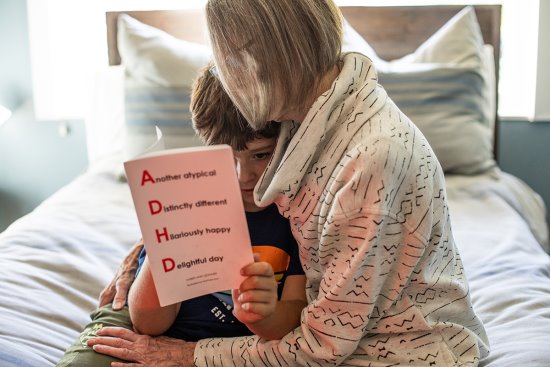
| ||||||
"Another atypical Distinctly different Hilariously happy Delightful day" is written from the point of view of a young boy with ADHD and is directed to 8- to 12-year-old readers who have received this diagnosis, as well as to their family, friends and educators. It focuses primarily on the positives associated with ADHD, with the child describing many of his ADHD characteristics as superpowers. As he states in the book, "My brain may work differently from yours but it works really well."
According to Children and Adults with Attention Deficit/Hyperactivity Disorder (CHADD), approximately 11% of school-age children are affected by ADHD. Considered a neurodevelopmental disorder, it is generally characterized by developmentally inappropriate levels of inattention, hyperactivity and impulsivity. The cause of ADHD is unknown, but current research indicates that genetics plays an important role.
Leonard, a Lafayette resident and grandmother to three boys, wasn't all that surprised when her grandson was diagnosed with ADHD before entering first grade. She had noticed he couldn't stay still; he always needed to be moving. "He had trouble focusing," she remembers. "If you asked him a question, it was like he was somewhere else and would bring up a different topic. Storytime at the library was virtually impossible, since he simply could not sit still."
At first, people responded to this hyperactive, unfocused behavior with a "boys will be boys" attitude. Kindergarten was difficult for Leonard's grandson, again because of his inability to sit still and stay focused. The behaviors were reported to his parents in a negative context; they were told he was disruptive and it was likely getting in the way of his ability to learn. At his pediatrician's suggestion, he was evaluated, diagnosed and given appropriate treatment which, Leonard reports, changed his behavior almost immediately. "He suddenly became a different child," she notes happily.
Leonard is a strong and vocal advocate for early diagnosis, which, she says, can prevent a significant amount of struggling and criticism. "ADHD kids experience the world differently. An early diagnosis opens a window not only for the child to figure out what's going on, but for the family to understand what's happening," she reports. "It gives them all time to accept, understand, encourage and find ways to thrive and succeed. The longer you wait, the more the child struggles."
That was Leonard's motivation for writing "Another atypical Distinctly different Hilariously happy Delightful day." Now retired, Leonard was an HR professional, not a writer, researcher, doctor or psychologist. "I wrote this book strictly from the heart," she says. All she wanted was to learn everything she could to help her grandson and other children and families dealing with ADHD.
Leonard strongly disagrees with the "disorder" portion of ADHD. "In my opinion," she notes, "ADHD kids do not have a disorder. They have a neurological processing difference," basically meaning it is how their brain is wired. In fact, the young boy in her book echoes this belief, stating, "ADHD is . definitely not a disorder. Quite the opposite. The way my brain works can be a huge asset."
"Another atypical Distinctly different Hilariously happy Delightful day" is not Leonard's first jab at writing a children's book; nor is it the first time that one of her grandsons was the impetus for her to take action.
When one of the boys was a toddler, she noticed that he often preferred to spend time alone, entertaining himself and "recharging his batteries." She remembered that she, too, was quiet as a child and wanted to spend time by herself. "Somehow it made me feel different," she reflects. "So when I saw my grandson acting in the same way, I wanted him to know that his behavior was not out of the ordinary and certainly nothing to be ashamed of."
With this thought in mind, Leonard wrote "All By Myself," a sweet book geared to children aged 3 to 6 years old. As she noted in the book's introduction, "Introverted children are valuable, creative, reflective thinkers ." and, she says in the story, being "all by myself . is calm, relaxing and comfortable."
"All By Myself," is out of print. "Another atypical Distinctly different Hilariously happy Delightful day," which was illustrated by Acalanes senior Matthew Koo, may be purchased at Amazon and Barnes & Noble. Leonard also has an Instagram site, team_adhd_kids, where she ends almost every post with, "Supporting and encouraging our ADHD kids is going to take an entire community. Let's build that community."
Reach the reporter at:
